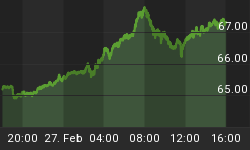In my two "Gold Is Not Money" posts (HERE and HERE) I explained why it is not correct to think of gold as money these days, and in a subsequent post I explained why it was not correct to view gold as an economic constant (there is no such thing as an "economic constant"). It is clearly also not correct to think of gold as "just a commodity", because if it were just a commodity then its price would have collapsed relative to the prices of other commodities due to the massive size of its aboveground supply relative to its annual usage in commercial/industrial applications. Instead, the price of gold is near an all-time high relative to the CRB Index. So, if gold isn't money and it isn't an economic constant and it isn't just a commodity, then what is it?
Is gold a speculation? That's a matter of opinion. Some of the commentators who claim that gold is money tell us that gold is not a speculation, but they are only expressing a personal view. For example, if I buy gold with the aim of selling it in a few months at a higher price, then gold is a speculation to me.
Is gold insurance? It can be, but many of the people who own gold do not hold it for insurance purposes. Gold is certainly not inherently a form of financial/monetary insurance, but it can be held for such a purpose. Furthermore, of the people who believe that gold can be used as financial/monetary insurance, one group thinks that it should be used for this purpose all the time while another group thinks that it should only be used for this purpose when the risk of monetary collapse is high. For example, I own gold and recognise its ability to be a form of insurance against financial catastrophe, but none of my gold is currently held for insurance purposes. In my opinion there isn't a good reason to hold gold for insurance purposes right now, because there will always be warning signs well in advance of a monetary collapse and those signs are currently not present (at least with regard to the US$). That's my opinion. Other people think differently.
Is gold a good store of purchasing power? It depends on the starting point and the time frame. Gold has lost a lot of purchasing power (PP) since its September-2011 peak and lost more than 90% of its PP from its January-1980 peak to its April-2001 trough. Furthermore, despite the huge gold rally of 2001-2011, someone who bought gold at its January-1980 peak (almost 36 years ago) and held to the present day is still down by more than 50% in PP terms. However, someone who accumulated a long-term gold position during 1998-2002 and held to the present day would still have a substantial gain in PP terms, despite the large decline of the past four years. In this respect gold is similar to investments in companies or real estate. Regardless of the quality of an investment, if the purchase price is high enough it will probably generate a large PP loss.
As an aside, the importance of timing will be obscured by extremely long-term studies. Of particular relevance, studies that assess gold's performance over centuries will suggest PP stability and will mask the fact that if you bought near one of the speculative peaks you would have sustained a permanent loss.
Is gold a financial asset? The answer is yes. Moreover, it is considered to be one of the world's most liquid financial assets, which is why some of the world's most important clearing houses accept gold -- along with other liquid financial assets such as T-Bills -- as collateral. However, physical gold is not someone's liability, which means that gold can't suddenly become worthless as the result of a default. In this respect gold is a safer financial asset than a T-Bill or any other security.
In summary, gold is primarily a liquid financial asset that can be held for speculative, insurance, store-of-purchasing-power or collateral purposes.















